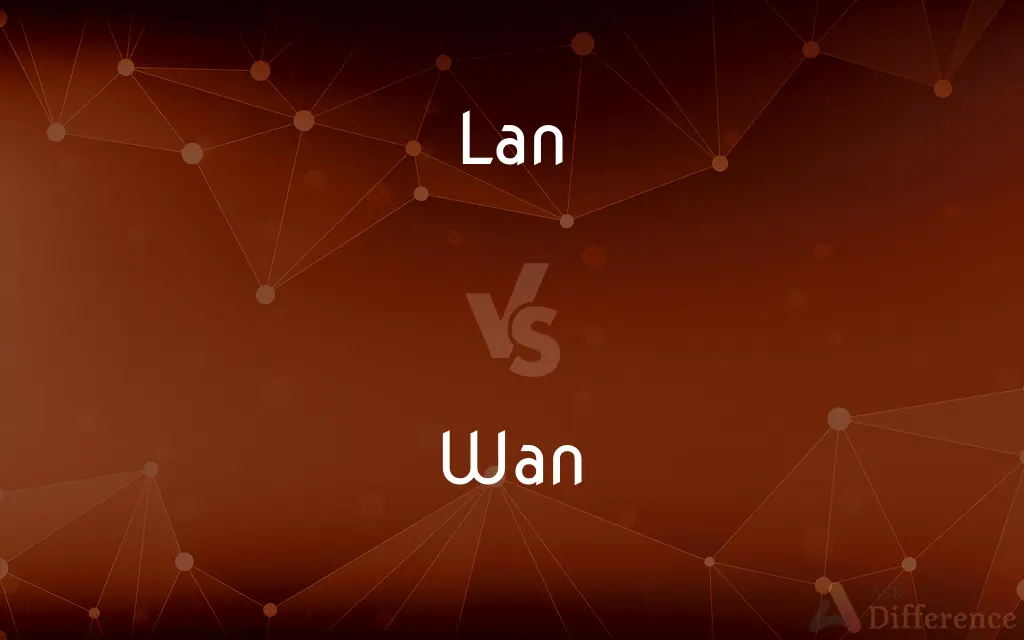LAN vs. WAN — What's the Difference?
By Tayyaba Rehman — Updated on September 21, 2023
LAN (Local Area Network) connects devices within a limited area, like a home or office. WAN (Wide Area Network) spans large geographical areas, connecting cities or countries.

Difference Between LAN and WAN
Table of Contents
ADVERTISEMENT
Key Differences
LAN, or Local Area Network, is designed to operate over a small physical area such as an office, building, or a campus. On the flip side, WAN, or Wide Area Network, is built to function over vast regions, potentially linking networks across cities, states, or even continents.
In terms of data transfer speeds, LAN generally offers faster speeds compared to WAN. This is because LAN connections are typically used in more localized settings. In contrast, WAN, encompassing larger distances, often has to negotiate multiple networks and traffic, possibly reducing speed.
A significant distinction lies in ownership. LAN infrastructure is usually owned, set up, and maintained by a single organization, ensuring more control over its operations. In contrast, WAN might involve multiple networks, with parts that might be public or leased from carriers.
LAN setups predominantly utilize Ethernet cables or Wi-Fi to connect devices. On the contrary, WAN uses technologies like MPLS, ATM, or frame relay, and may even employ satellite or undersea cable links to interconnect distant locations.
Regarding costs, setting up and maintaining a LAN is generally more cost-effective, given its limited scope. WAN, covering broader areas, can be more expensive, considering the infrastructure, technology, and service fees from providers.
ADVERTISEMENT
Comparison Chart
Coverage Area
Local (e.g., home, office)
Wide (e.g., city, country, global)
Speed
Typically faster
Varies, generally slower than LAN
Ownership
Usually owned by a single entity
Can be public or leased
Connection Method
Ethernet cables, Wi-Fi
MPLS, ATM, satellite, undersea cables
Cost Implications
Generally more cost-effective
Can be more expensive
Compare with Definitions
Lan
A communication network restricted to a building or campus.
With the LAN in place, students could access the library database from anywhere on campus.
Wan
A network covering a broad area, often spanning cities or countries.
The corporation used a WAN to connect its international offices.
Lan
A localized computer network using wired or wireless connections.
After installing the LAN, the entire household could use the printer.
Wan
A wide-reaching network that can be public or private.
Large enterprises invest in WANs to ensure data flow across locations.
Lan
A network connecting computers within a limited area.
The office set up a LAN to share files and resources.
Wan
A network encompassing vast distances, using various technologies.
The telecom company expanded its WAN coverage to remote areas using satellite technology.
Lan
A confined network often managed by a single entity.
The company upgraded its LAN to support the growing number of employees.
Wan
A communication infrastructure linking multiple LANs.
Their WAN allowed seamless communication between regional branches.
Lan
Network offering high-speed data transfer in close proximities.
The company's LAN ensured fast and secure data transfer between departments.
Wan
A geographically dispersed network, often involving leased lines or public networks.
The new WAN setup allowed the company to operate smoothly across continents.
Lan
A system that links together electronic office equipment, such as computers and printers, and forms a network within an office, building, or group of buildings
Wan
A communications network that uses such devices as telephone lines, satellite dishes, or radio waves to span a larger geographic area than can be covered by a LAN.
Lan
A local area network; a network{3} connecting computers and word processors and other electronic office equipment within a small area, to create an inter-office system, typically within one building or one site of a corporation. Contrasted to WAN, a wide-area network.
Wan
Unnaturally pale, as from physical or emotional distress.
Lan
A local computer network for communication between computers; especially a network connecting computers and word processors and other electronic office equipment to create a communication system between offices
Wan
Suggestive or indicative of weariness, illness, or unhappiness; melancholy
A wan expression.
Wan
To become pale.
Wan
Pale, sickly-looking.
Wan
Dim, faint.
Wan
Bland, uninterested.
A wan expression
Wan
The quality of being wan; wanness.
Wan
Pronunciation spelling of one
Wan
(Ireland) A girl or woman.
Wan
(obsolete) win.
Wan
Won.
Wan
Having a pale or sickly hue; languid of look; pale; pallid.
My color . . . [is] wan and of a leaden hue.
Why so pale and wan, fond lover?
With the wan moon overhead.
Wan
The quality of being wan; wanness.
Tinged with wan from lack of sleep.
Wan
To grow wan; to become pale or sickly in looks.
And ever he mutter'd and madden'd, and ever wann'd with despair.
Wan
A computer network that spans a wider area than does a local area network
Wan
Become pale and sickly
Wan
(of light) lacking in intensity or brightness; dim or feeble;
The pale light of a half moon
A pale sun
The late afternoon light coming through the el tracks fell in pale oblongs on the street
A pallid sky
The pale (or wan) stars
The wan light of dawn
Wan
Abnormally deficient in color as suggesting physical or emotional distress;
The pallid face of the invalid
Her wan face suddenly flushed
Wan
Lacking vitality as from weariness or illness or unhappiness;
A wan smile
Common Curiosities
Are LANs typically faster than WANs?
Yes, LANs generally offer faster data transfer speeds than WANs.
Is the internet considered a WAN?
Yes, the internet is a global example of a WAN.
How broad is a WAN's reach?
A WAN can span cities, countries, or even continents.
What does LAN stand for?
LAN stands for Local Area Network.
Can a home network be considered a LAN?
Yes, a home network connecting multiple devices is a type of LAN.
Share Your Discovery

Previous Comparison
Bronchitis vs. Bronchiolitis
Next Comparison
Erotism vs. PassionAuthor Spotlight
Written by
Tayyaba RehmanTayyaba Rehman is a distinguished writer, currently serving as a primary contributor to askdifference.com. As a researcher in semantics and etymology, Tayyaba's passion for the complexity of languages and their distinctions has found a perfect home on the platform. Tayyaba delves into the intricacies of language, distinguishing between commonly confused words and phrases, thereby providing clarity for readers worldwide.














































